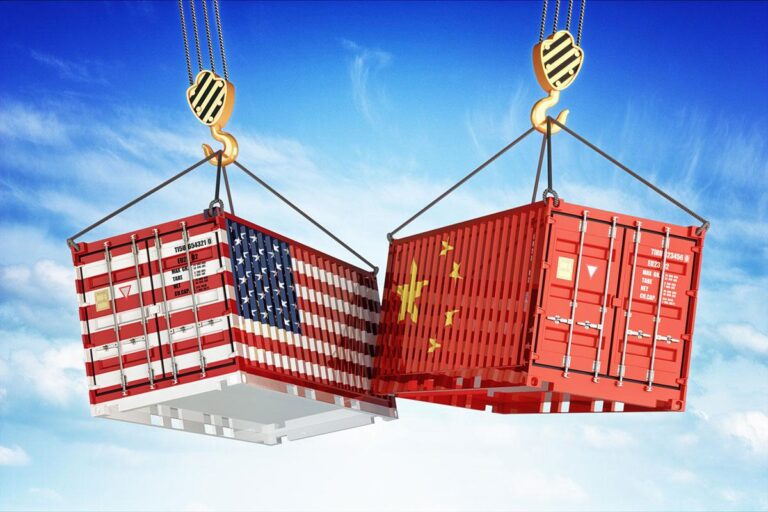China has firmly responded to President Donald Trump’s recent threat to impose 100% tariffs on Chinese goods, emphasizing its stance of non-involvement in trade conflicts described as “wars.” In a sharp rebuke, Chinese officials highlighted their commitment to peaceful economic engagement while condemning the escalating tariff measures as detrimental to global trade stability. This exchange marks the latest escalation in the ongoing trade tensions between the world’s two largest economies, raising concerns over the potential impact on international markets and diplomatic relations.
China Responds Firmly to Trump’s Tariff Threats Amid Growing Trade Tensions
China’s Ministry of Commerce issued a resolute statement today, firmly rejecting former President Donald Trump’s recent declaration to impose 100% tariffs on Chinese imports. The response emphasized that China does not engage in trade wars but is fully prepared to defend its legitimate interests and ensure economic stability. Officials stressed that such unilateral tariff hikes would only escalate tensions and disrupt the global supply chain, urging a return to constructive dialogue over confrontation.
Key points from China’s stance include:
- Opposition to trade war tactics: Declaring that such methods harm all parties involved.
- Commitment to open markets: Affirming China’s dedication to free trade principles.
- Focus on negotiations: Calling for mutual respect and balanced solutions through talks.
| Impact Area | Potential Effects |
|---|---|
| Consumer Prices | Likely increase due to higher import costs |
| Global Markets | Heightened volatility and uncertainty |
| Supply Chains | Potential disruptions and delays |
Economic Impact of Potential 100 Percent Tariffs on Bilateral Relations
The proposed implementation of 100 percent tariffs has sent shockwaves through global trade markets, threatening to destabilize the delicate economic balance between the United States and China. Such an aggressive tariff policy could lead to a cascade of retaliatory measures, risking a full-scale trade war with profound consequences not just bilaterally but across the global economy. Key sectors like manufacturing, agriculture, and technology would face immediate cost surges, rippling through supply chains and inflating prices for consumers worldwide.
Analysts warn that beyond the direct financial toll, the diplomatic strain could severely impair cooperation on global challenges such as climate change, intellectual property rights, and security partnerships. Below is a simple breakdown of potential economic repercussions:
| Sector | Potential Impact | Long-Term Effect |
|---|---|---|
| Manufacturing | Supply chain disruptions | Shift of investments to other regions |
| Agriculture | Export decline due to tariffs | Farmer income instability |
| Technology | Restricted access to components | Innovation slowdown |
- Consumer prices surge, reducing purchasing power.
- Business confidence deteriorates, stalling investment.
- Global markets experience heightened volatility.
Strategies for Businesses to Navigate Uncertain US-China Trade Environment
In the face of escalating tariffs and retaliatory measures, businesses must adopt agile strategies to mitigate risks stemming from the volatile US-China trade landscape. Diversifying supply chains has become imperative, with many companies exploring alternative manufacturing hubs in Southeast Asia and Mexico to evade potential tariff spikes. Embracing digital transformation is equally critical; enhanced data analytics and supply chain visibility tools enable firms to respond swiftly to trade policy shifts, minimizing operational disruptions. Furthermore, fostering strong relationships with local authorities and trade associations can provide timely insights and advocacy channels that prove invaluable during trade tensions.
Key Approaches for Resilience and Growth:
- Supply Chain Flexibility: Establish multi-sourcing strategies to reduce dependency on a single country.
- Cost Management: Invest in automation and lean manufacturing to offset increased tariff costs.
- Market Diversification: Expand into emerging markets to spread geopolitical risk.
- Proactive Compliance: Stay updated with trade regulations and tariffs to avoid penalties and delays.
| Strategy | Benefit | Implementation Tip |
|---|---|---|
| Diversified Sourcing | Reduced Tariff Exposure | Identify suppliers in tariff-free zones |
| Automation Investment | Lower Operational Costs | Adopt robotics and AI tools |
| Market Expansion | Revenue Stream Growth | Target emerging economies with trade incentives |
To Conclude
As tensions between the United States and China continue to escalate over trade disputes, the recent exchange underscores the deepening rift between the two economic giants. China’s firm stance against the imposition of additional tariffs signals its commitment to defending its interests amid mounting pressure from the U.S. administration. As both nations navigate this complex relationship, the global community watches closely, mindful of the broader implications for international trade and economic stability.




